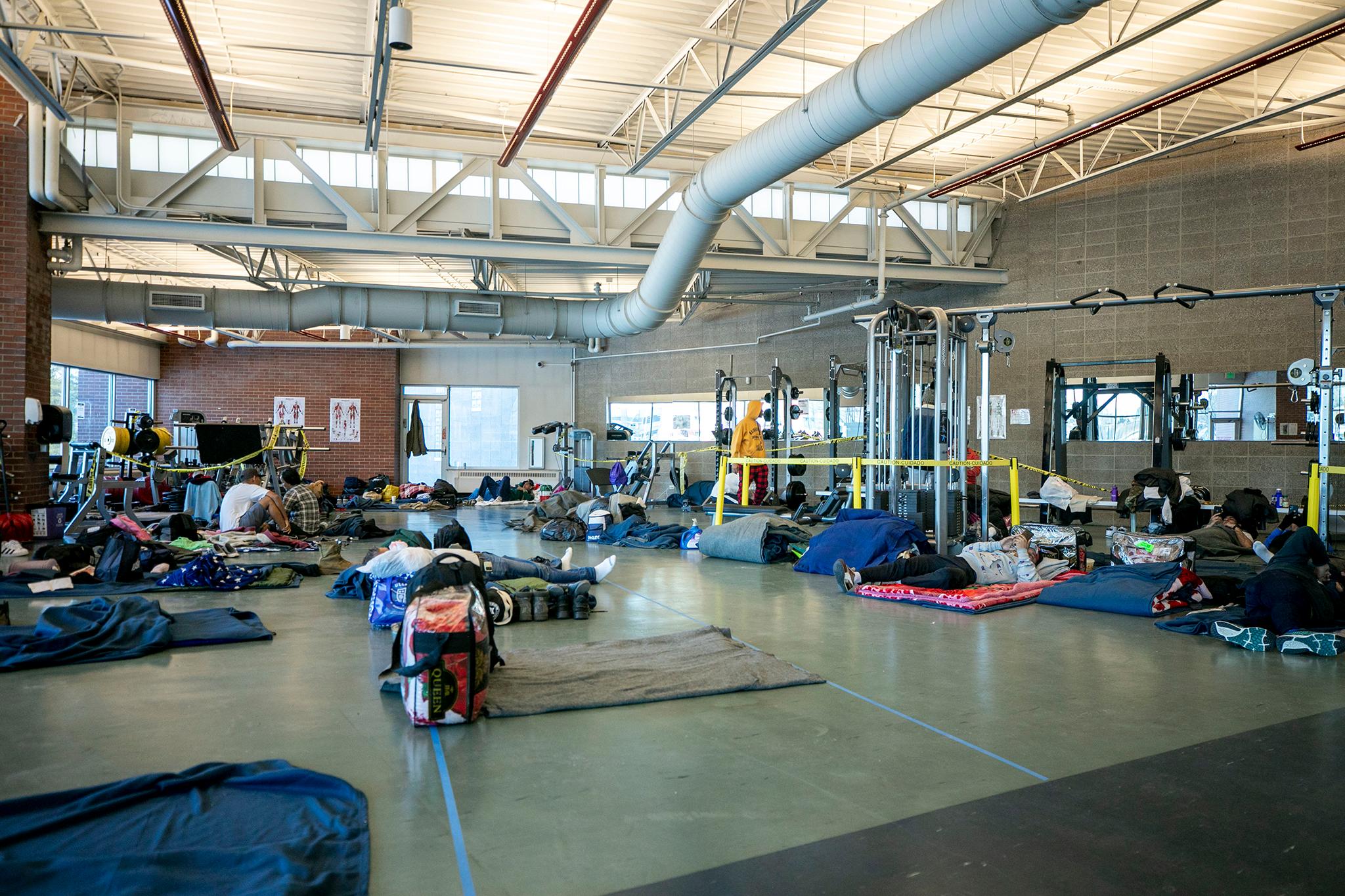Mayor Michael Hancock has ordered the city to begin decommissioning rec centers as shelters for migrants arriving in the city. The city has also begun informing people arriving that they can only stay at emergency shelters for 14 days upon arrival.
Hancock said the city does not yet have an exact timeline on decommissioning the rec centers, and that Denver will look for community partnerships and the use of city buildings that do not serve the public for additional support.
"We gotta get the rec centers back to their intended purpose," Hancock told Denverite Monday.
The Archdiocese of Denver said last week that it was considering using the Mullen Home, which once functioned as an elder care center, as a shelter after Hancock asked for help. A spokesperson for the Archdiocese said there was no update on that plan as of Monday.
Hancock and the city say there's been a drop in the number of people arriving in Denver the past few days.
Between Jan. 5 and 9, fewer than 100 migrants arrived in Denver each day. Arrivals numbered ranged from around 110 to around 220 at the end of December.
According to the city's latest update, 582 are currently staying in city and partner shelters. A week ago, that number was 871.
Hancock has previously denounced what he claims is a lack of federal leadership on migration and people arriving at the border. But on Monday, he praised President Joe Biden's recently announced policy cracking down on unauthorized border crossings.
"The federal government helped us an awful lot with the new policies, at least the administration in the short term," Hancock said, crediting the drop in recent arrivals on Biden's new policy.
The policy prevents people from Cuba, Nicaragua, Venezuela and Haiti from being able to apply for asylum if they cross the southern border illegally. It also allows up to 30,000 people per month from those countries to enter the U.S. legally if they meet certain financial requirements, including buying a plane ticket and having a financial sponsor in the country.
But it's not clear whether Biden's policy is causing a decrease in the number of people crossing into the U.S. or coming to Denver.
Ruben Garcia runs Annunciation House, a shelter for people at the border that has coordinated travel to Denver for migrants in recent months. He said it's too soon to know whether Biden's policy is causing the lower numbers. Plus, he said, in his experience, numbers always tend to go down this time of year.
"I probably wouldn't say that," he said about any potential effect of Biden's policy. "I think that if you go back last year, and the year before and the year before, you're gonna see that this time of the year, the numbers go down.
Immigration advocates say the policy is too restrictive, and worry it will exclude people without financial resources. The national chapter of the American Friends Service Committee, which is partnering with the City of Denver at the local level to support migrants, released a statement in opposition to Biden's decision.
"We strongly believe that an enforcement approach in response to people seeking safety is misguided and cruel, and will only exacerbate the precarious conditions that endanger the lives of those seeking safe harbor," wrote Program Director Pedro Rios. "We urge the Biden administration to re-prioritize its approach by centering policies on the human rights of migrants seeking asylum in the United States."
Garcia said he's glad to see any policy that opens opportunities for people to legally enter the U.S., but that this policy is not written with the lived reality of migrants in mind.
"A lot of people from Venezuela, for example, do not have sponsors with the financial resources to sponsor them, so it's not going to be accessible to them," he said.
The Department of Homeland Security did not respond to a request for comment on any effect so far on Biden's policy at the border.
While shelters at rec centers remain open, Denver will only allow migrants to stay for up to two weeks.
"We are hoping that within those 14 days, they'll get the rest that they need," said city spokesperson Jill Lis. "They'll get tapped into resources that'll help them kind of move on in their journey, and so then transitioning them to other shelter locations, or reunifying those with family members either in Denver, in Colorado, out of state, those kinds of things."
"You gotta give a timeline," Hancock said. "You gotta signal to people that this is not meant to be a permanent arrangement here, that we have finite resources to respond."
Gov. Jared Polis' office announced a partnership with two nonprofits last week that would bus people looking to travel elsewhere in the U.S., but rolled back the plan to bus people to Chicago and New York City after mayors in both cities asked Polis to stop due to a lack of resources.
Meanwhile, Hancock said he's still looking for longer term solutions at the national level.
"Congress has done absolutely nothing to address it, and that, to me, is a failure of government, that to me is a dereliction of duty," he said. "Cities and states are the only ones who are saying, 'Let's focus on the people and make sure we do right by them. Federal governments decide to play partisan politics.'"
This story has been updated.













